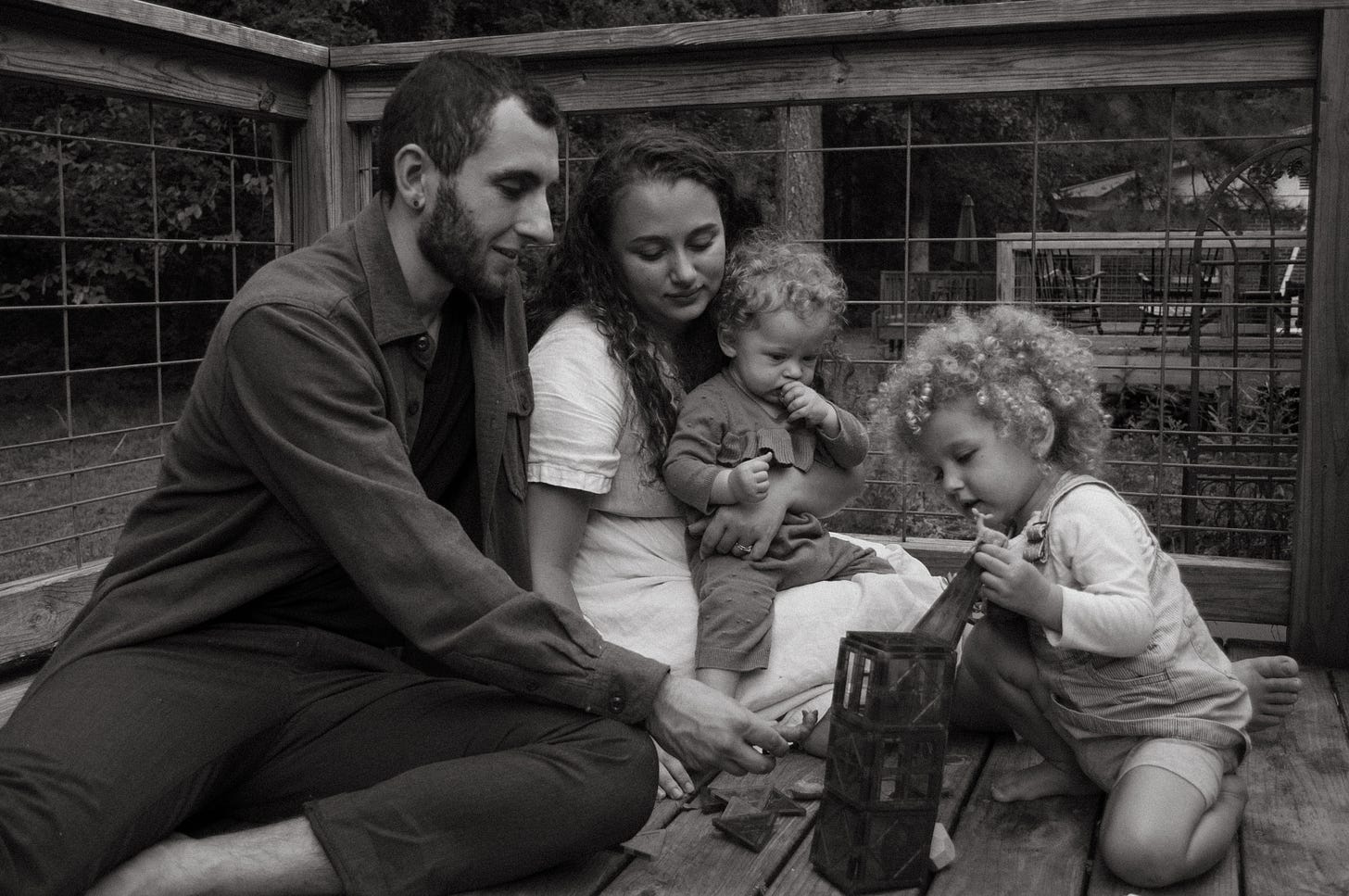Excellence vs. Ambition
How God Delivered Me From Ambition and Taught Me to Appreciate Excellence
Last week, I was at my Well-Read Mom’s book club and we were discussing Steinbeck’s The Pearl. In this story, one of the main characters happens upon a fortune that, he believes, has the potential to change the trajectory of his and his impoverished family’s life. He begins to dream of all the ways his family will now be able to transcend their current economic and social state. These dreams in and of themselves are not bad — for example, he wants he and his son’s mother to be married properly in the church, and he wants to send his son to school so he can learn to read and thus inform his illiterate family about what is “really happening” in the world. But this man’s dreams become his undoing.
Thus, our group got to talking about ambition. This is a topic I am familiar with, as a recovering Ambitious Woman, myself. I love the look of surprise when I tell someone that, at the time of my conversion to Christianity and Catholicism, ambition was my greatest sin and it was one of the first ways God undid me. Most people don’t think ambition is a sin, and I’m sure many of you out there are willing to go to bat with me over this. But God convicted me of this almost seven years ago, and in preparation for writing this essay I looked up what St. Thomas Aquinas says on the matter, just in case, and we happen to agree — so I will proceed.
Before my conversion, ambition dominated my life. In a way, I think it is what allowed me to survive until I could learn to let God sustain me. I was born to a teenage mother, and neither of my parents graduated high school. As their firstborn, they placed all their hopes in me. I distinctly remember my father giving me a bath as a young child where he told me I could be anything when I grew up. He said he thought I could be the first female and biracial president. As most little girls do, I believed him. And I acted like it! I always had big dreams. I dreamed of becoming a movie director, an author, an astronaut, etc. And I didn’t just dream. I was always working on these dreams. I was obsessed with optimizing my path toward accomplishing my goals. I wrote endless stories with pen and paper and on the desktop computer. I entered and won writing contests. I used obscure computer programs to make short animated films. Even in elementary school, I read all of the non-fiction books I could get my hands on pertaining to subjects I was interested in. My teachers made it clear that being an excellent student was the best method to opening doors to any dream, so I did that. I even begged my mom to send me to boarding schools and prep schools.
When I was eight years old my father died suddenly, and the pressure amped up. Generally, the pressure was to be self-sufficient and convenient. The less guidance, discipline, and sustenance I could ask of my mother the more praiseworthy I was and the better our relationship was. I can’t say there was love in that relationship, but I do think there was admiration. I did not feel known or understood by my mother, but I knew I brought honor to her. This taught me that the most honorable thing to be is to be self-sufficient — so I started optimizing that, too.
At fourteen years old, one of my first real boyfriends broke up with me because he said I was very ambitious and clearly “going somewhere” and he wasn’t. Very noble. Anyway, in my teens I aspired to be a ballet dancer or play violin professionally. I loved that these required daily practice to improve, and the improvement was immediately evident. Unfortunately, our family made an ill-advised move to an area where I could no longer do those things so my priorities had to shift. Upon discovering Model United Nations (a fancy debate club where you basically simulate United Nations councils), I began to dream of working in foreign policy particularly pertaining to women’s rights and environmental issues. This dream carried me into college.
Throughout high school and college, I campaigned and applied for leadership positions at every turn. I can honestly say that I truly did desire to make a positive change wherever I was, but I also can’t lie: I loved the honor. I loved to be admired. If I could not be loved, I wanted to be admired and respected. I dated, but I told friends and dates alike that it was hard to imagine getting married or becoming a mother because I had so many other ambitions. Most people, even religious leaders and spiritual directors, agreed. You see, I never aspired to anything that was clearly materialistic or self-centered. I wanted to help people. I wanted the world to get better. At first, when I was coming to know God, I saw Him squarely as an agent of change and justice. I pretty much saw Him as a means to an end, not the end itself.
In my junior year of college, my perception of God changed when I encountered the saints. I began to see that God is the end and that we are called to an intimate relationship with Him. Worldly achievement and honor may come out of that — but usually, it doesn’t. Many of the great saints we know today were shunned and shamed when they were alive.
I felt an uncharacteristic call to stop striving. St. Rose of Lima and St. Teresa of Avila were the most instrumental in drawing me to the Church, but when it came time to pick my confirmation saint I felt inexplicably drawn to St. Therese of Lisieux, despite knowing next to nothing about her. What I did know was that she was a Doctor of the Church for one teaching: her Little Way. This idea that God will make us holy by asking us to do small or mundane tasks excellently and for Him. Not everyone will be called to do big and great things, but they are still called to Heaven. I knew I needed more of that.
I converted in the spring of my junior year and by the end of the school year, God thwarted almost all of my attempts at senior leadership. He even went as far as to allow my humiliation. My vision for senior year fell apart as he gave me humbler and quieter dreams. In my senior year, I hosted a humble women’s bible study and an Exodus 90 group, I occasionally led worship for a basement women’s ministry, I organized social events for Catholic students on campus, and I gardened. I was not the president or boss of anything. My senior year schedule was half as packed as junior year. I read books and applied to graduate school. My professors asked why I hardly talked in class anymore and I told them it was because I was too busy listening.
After a fall semester, I was surprised in the spring to receive acceptance and a generous scholarship to a prestigious graduate program. I met with my favorite faithful professor and asked him: how do you not let academia get to your head? With all the performing and awards and winning and being right and self-promotion that is necessary to succeed and make a living in the field… how do you make it out alive and holy? Studying theology and church history felt edifying so far… but prestige felt wrong. And yet, prestige is what you have to have to keep going and get paid. (If you want to read more about my decision to leave academia, check out my essay on it here.)
By the end of my master’s program, despite what I’m sure was excellent advice from the aforementioned professor, I couldn’t see a way forward. So I took a year off, which has since turned into “retirement” (see previously mentioned essay). But God used my studies to teach me about being little. He taught me about seeking Him instead of seeking titles, even if I think those titles are for his glory. God used my education and accolades to lead me in devoting years to learning and talking about Him — something I probably wouldn’t have made time to do if I had chosen a career path outside of theology and church history. Now I love Him, know about Him, and have the skills to continue learning and talking about him with my children and other lay people walking this path alongside me. Also, in preparing for a career that I thought would make very little money, He taught me to appreciate poverty and abandon attachment and aspirations to material excess before I started my family, when those temptations creep in the most aggressively (The Pearl by Steinbeck is a great example of this). God used my ambition for my good1 — that is, to draw me to Himself. This was necessary because it was so integral to my identity. He chipped away at it slowly and mercifully.
And still, being little is not just about resisting ambition. It’s about doing everything God asks you to do, no matter how seemingly small or inconsequential, excellently. We must bear the crosses he gives us not just well, but excellently. Ambition in your spiritual life can look like seeking more crosses to carry “for God” when you’re not even carrying the ones He already gave you well. I see mothers do this a lot. They find new ways to make their lives harder, ways that other people would recognize as holy or virtuous, and in the process they neglect their families or homes. If you think God is asking you to do something extraordinary then first ask: am I already doing the ordinary, boring, mundane things he has asked me to do… and am I doing them well? Do they bring glory to Him?2 God will call you to the hardships best suited for your sanctification. He will give you crosses freely, you don’t have to go seeking them out. Usually they will not be the crosses you wanted or imagined, and that makes them even better.
St. Josemaria Escriva is an excellent saint to read when it comes to understanding the sanctifying power of work. God has put a task before you: honor him by doing the task well. A few weeks ago I thought I was pregnant because I saw a video of a sixteen-year-old boy making a rocking chair completely from scratch. In watching him whittle the wood and join the pieces together, I was moved to tears. I informed my husband that night “I’m probably pregnant!” But it turns out I was just moved by the boy’s humble yet excellent craft.
When you do a task excellently there is something beautiful in it that points you, and others who witness it, to God. Something as “small” as witnessing this boy make a rocking chair made me think about God’s creative power, and how he desires to sanctify our work and make it meaningful. He was not saving a life or curing cancer, but I thought about how his mother or grandmother might sit in that chair — maybe they would rock his younger sibling or cousin to sleep in it. I thought about how someday he might rock his own baby to sleep in it. Perhaps someday his granddaughter might inherit it and tell her children “Your grandfather made this when he was just a boy. It rocked me to sleep, and now it rocks you to sleep.” If you don’t have children this might sound inconsequential. But if you are a parent then you know that magic ticket to get a baby to sleep means everything — and there is nothing like being able to tangibly imagine others have been through the same thing during those 3 am wakeups.

That boy could have spent all of those hours playing video games or scrolling on social media like I do. He could have spent that time training for a marathon or entering a contest that would look good on his resume. Instead he used his time to make something beautiful with the hands God gave him. I cannot comment on if he was called to do that, but I know I am called to care for my husband and children, and I can make an effort to do that more beautifully and excellently. I can sew a beautiful garment for my daughter, and I can make an excellent and nourishing dinner for my whole family. I have also felt a calling to sign up for every meal train I come across (within a reasonable distance), and to prepare only my most delicious and nourishing meals for the recipients. I can work at these skills every day, and when my family praises me I know that it is only through God’s assistance that I was able to do it at all — and I should tell my family so. Doing these basic things is already hard enough, and I have a long way to go in perfecting them so that they better reflect God.
God sends me challenges all the time that mostly pertain to caring for my family or being more available to my friends, church, and community. So for now, and likely forever, I’ve abandoned all ambitions of worldly honor, glory, and popular success. I am just trying to get better at carrying the crosses He has already given me. At this time I have not been made aware of a calling to anything extraordinary, at least not by worldly standards.
P.S. I do think it’s okay to take up challenges just for the sake of doing hard stuff, I just always try to make sure that in completing these challenges I’m not distracting myself from my vocation. For example, in this season it would demand too much of my time to train for a marathon or triatholon (something I would like to do someday) but I recently started a course on Karl Marx and Communism, and I do group fitness classes at my local gym a few days a week!
“And we know that in all things God works for the good of those who love him, who have been called according to his purpose.” Romans 8:28 NIV
“He who is faithful in a very little is faithful also in much; and he who is dishonest in a very little is dishonest also in much. If then you have not been faithful in the unrighteous mammon, who will entrust to you the true riches? And if you have not been faithful in that which is another’s, who will give you that which is your own? No servant can serve two masters; for either he will hate the one and love the other, or he will be devoted to the one and despise the other. You cannot serve God and mammon.” Luke 16:10-13 RSV








Hi Jazz. I wrote an email to you earlier today with the email address on your Facebook page. I only discovered that today and explained this in my email. I hope you will respond to me. I would love to send a book to you and share with you The Cloistered Heart. Blessings.
Thanks for sharing your reflections Jazz! I love reading them 😄